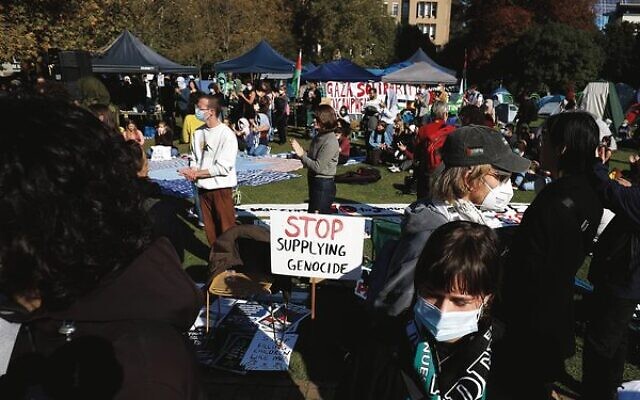Are we preparing our students for university?
Looking from the back towards the front of a hall filled with over 100 students, there was a sea of kippot – at least 40 students, many of whom I did not know were Jewish.
In 1973, I was a student at Melbourne University. During my studies I spent time teaching religious instruction at University High across the road from the university. This meant I would arrive late to my 9am lecture, so instead of entering the theatre-style lecture room from the regular entrance, I slipped through a door at the rear of the hall. It was during the Yom Kippur War and the sight before me was something I will always remember.
Looking from the back towards the front of a hall filled with over 100 students, there was a sea of kippot – at least 40 students, many of whom I did not know were Jewish – who had chosen to proudly display their identity in support of Israel during a very difficult war.
How times have changed over the past 50 years. While today there remain a body of students who, in the face of unprecedented antisemitism and racial vilification on campus continue to proudly display their Jewishness, many are running for cover afraid of a dangerous zealous element of bigotry which has invaded the university environment.
In eight months from now, hundreds of Jewish students who have chosen to attend university will face this challenge. During Orientation Week, they will have to navigate their path around tables and displays which extol the Palestinian cause and demonise the Jewish nation and the State of Israel. Once the year commences, they may be attending a lecture theatre where the Palestinian flag is being flown unashamedly. They may be sitting in a tutorial next to or between keffiyeh-wearing students – the same ones who at a lunch time demonstration chant “from the river to the sea”. These students may also be the organisers of the infamous encampments which have sprung up across the university environment like poisonous mushrooms. Their lecturers and professors may espouse these very causes.
Our community is to be commended for its organisation and attendance at rallies across the spectrum of Jewish affiliation and beliefs. The sense of unity has inspired many to stand up and be counted.
But how are we preparing our students for what lies ahead on the university campus as they commence their tertiary education? Do they remain silent, or do they speak up? Do they engage or do they keep a distance? Do they wait to be spoken to or do they initiate conversation? And if they do speak, what do they say? How best to answer the baseless accusations of genocide? What do they say when images of dead babies and mutilated bodies, or the destruction of a hospital in Gaza are shoved in their faces?

How do we ensure that our students do not get swept up in the tide of the groupthink that underlies the misguided protest movements, the rallies and the encampments? This frightening possibility cannot be ignored. Already we are aware of the participation of Jewish students in the anti-Zionist and anti-Jewish rallies.
How are our Jewish schools preparing our students for these challenges? Would it be worthwhile considering a united effort by all our schools to introduce programs – and possibly written material – to address this situation? Certainly, the opportunity to find time in the VCE/HSC year for anything more than the studies themselves, is extremely challenging and whatever can be done will be limited by these constraints (and the closer the VCE/HSC exams are, the more difficult this becomes). One or two information days would assist students afraid of what confronts them as they contemplate their future at university.
It is up to the educational experts to establish an effective information program. I believe it is also important to understand the dynamics of this protest movement, how its members recruit the uninformed and the ignorant, as well as the insidious methods that are being used to brainwash and manipulate their minds.
Our students today are the leaders of tomorrow. Allowing for the spread of unchallenged misguided and misinformed views about the events occurring in Israel has the potential to reverberate in the minds of students and create immeasurable damage to their identity, values and beliefs. How much more so, for those students who one day will enter positions of leadership and may even influence public office. This issue cannot be ignored.
Raphael Aron is the director of Cult Consulting Australia and the author of five books.


comments